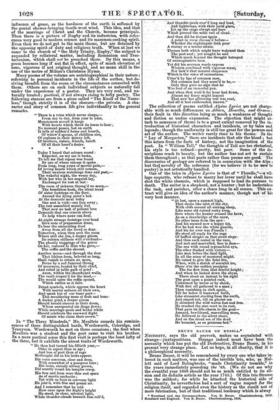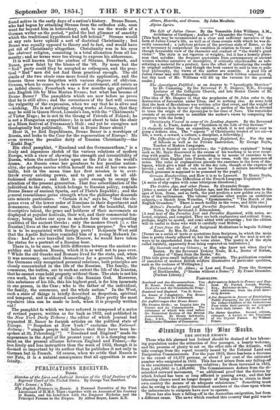BRUNO BAUER ON 'Russia.'
NECESSITY, says the old proverb, makes us acquainted with strange—juxtapositions. Strange indeed must have been the necessity which has put the on-Destructive, Bruno Bauer, in his present very strange place. Let us hope, in all charity, that it is a philosophical necessity. Bruno Bauer, it will be remembered by every one who takes in- terest in such matters, was one of the terrible trio who, as Isal- lett said of Lord Bolingbroke, "made Christianity tremble," in the years immediately preceding the '48, (We do not see why the eventful year 1848 should not be as much entitled to its eli- sion and its definite article as the year 1745.) Of this trio Strauss was the mildest; for while he attacked the historical side of Christianity, he nevertheless had a sort of vague respect for the religion itself, and regarded even the history as the result not of mere fabrication, but of that traditional tendency whioh is alway • Roseland mid das Germanenthum. Von B. Bauer. Charlotteuburg, 1853. Busaland und England. Von B. Bauer. Charlottenburg, 1854.
found active in the early days of a nation's history. Bruno Bauer, who had begun by attacking Strauss from the orthodox side soon went far beyond him in heterodoxy, and, to use the word; of a German writer on the period, "paled the last glimmer of sanctity which the traditional hypothesis had left behind." Strauss would
at any rate have upheld a sort of doctrinal Christianity; but Bruno was equally opposed to theory and to fact, and would have got rid of Christianity altogether. Christianity was in his eyes the abstract religion, consisting in a total alienation from all hu- manity ; and no terms were too strong to express his abhorrence.
It is well known that the nimbus of Strauss, Feuerbach, and Bauer, grew faint by the blazes of the '48. By none but the "Red" party could they be accepted as colleagues, and the prac- tical " Red " men did not find them practical enough. The old simile of the two stools once more found its application, and the famous three were forgotten with various degrees of oblivion. Strauss, when he ceases to be a cause of excitement, still exists as an infidel classic ; Feuerbach was a few inonths ago galvanized into English life by Miss Marian Evans; but what has become of Bruno Bauer ? The pamphlets which are now before us prove that he is still alive; and the correctness of the fact will excuse
the vulgarity of the expression, when we say that he is alive and _kinking. He is not printing strong works at jersey, that they may be sold in Queen Street, Lincoln's Inn, with the " Chatiments ' of Victor Hugo; he is not in the throng of Friends of Poland; he is not a Hungarian sympathizer; he is not about to take the chair at a Blum festival at Freemason's Hall : and yet he energizes not theologically but politically. What is Bruno Bauer about ?
Hear it, ye Red Republicans, Bruno Bauer is a worshiper of Russia, and looks to the Czar for the regeneration of Europe ! He even reveres the peculiar deity of Russian Christianity—the " Mudd. Bog." His chief pamphlet, " Russland und des Germanenthum," is a lively and ingenious sketch of the various relations of modern Europe, with a view of showing the strength and irresistibility. of Russia, whom the author looks upon as the Fate in the world's drama. As Russia owes her greatness to her peculiar nation- ality, she perhaps carries within herself the seed of her 'own mor- tality, but in the mean_ time her first mission is to over- throw every existing power, and to put an end to all old- fashioned notions ; and that is quite enough to occupy the attention of the present generation. That fine subordination of the individual to the state, which belongs to Russian policy, reminds Bruno Bauer of ancient Sparta, and of Plato's Republic ; and the general resemblance gains strength when the philosopher descends into minute particulars. "Certain it is," says he, "that the ele- gance even of the lower order of Russians in their deportment and demeanour, their natural- ease, their love of the beautiful, their descriptive talent, the grace and boldness of their movements as displayed at popular festivals, their wit, and their commercial ten-
dency, bring before our eyes in modern form the corresponding qualities of the ancient Greeks ; only the modern Greek [t. e. the
Russian] lives at the same time for a Roman purpose." See what it is to be acquainted with foreign parts ! Benjamin West said that the Apollo Belvedere reminded him of a young Mohawk In- dian: had he ever travelled into Moscow, he would have taken the statue for a portrait of a Russian boor.
There is, to be sure, one little difference between the ancient re- publics and modern Russia which it is as well not to pass over. "While the old Greeks and Russia, lived for the state, and, when
it was necessary, sacrificed, themselves for a general Idea, while the Germans only recognized personal relations, both principles are closely concentrated in the life of the Russian. The family, the
commune, the nation, are to such an extent the life of the Russian, that he cannot even hold property withbut them. The state is not his own work, but the work of God—the Russian God. Moreover, this substance of his life, this his highest goal, is for him incarnate in one person, in the Czar; who is the father' of the individual,
the family, the commune, and the whole nation." In the West, such a state of things is briefly described as despotism spiritual
and temporal, and is abhorred accordingly. How pretty the most repulsive idea can be made to look, when it is properly written out !
The pamphlet to which we have referred is composed of a series of revised papers, written as far back as 1852, and published in the New York Daily 7)-ibune ; the editor of which journal had requested M. Bauer to furnish articles on the political state of-' Europe. [" Bespoken at New York !" exclaims the National- Zeitung ; simple people will believe that they have been be- spoken at St. Petersburg !"] " Eassland und England" made its appearance in the April of the present year : it is a damping com- ment on the present alliance between England and France,—far less lively and less instructive than the work of 1852, though it is deemed so important by its author that lie publishes it not only in German but in French. Of course, when we settle that Russia is our Fate, it is a natural consequence that all opposition is mere fatuity.

























 Previous page
Previous page